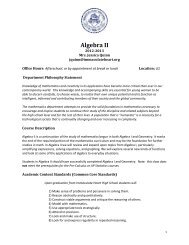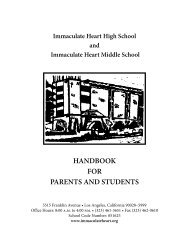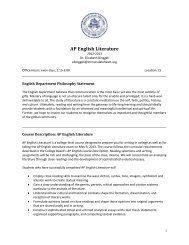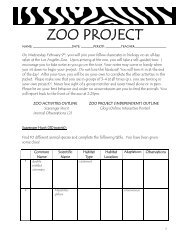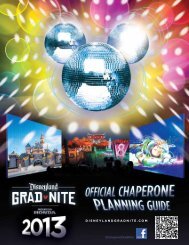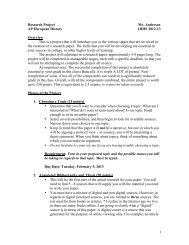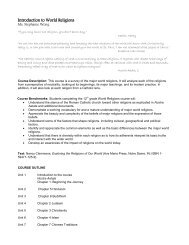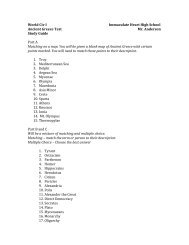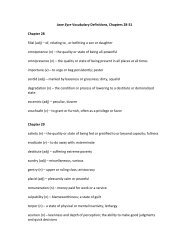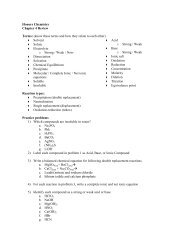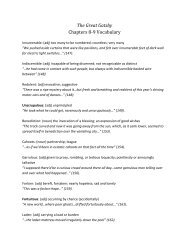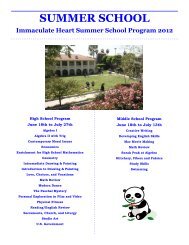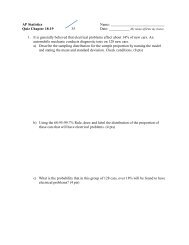syllabus - Immaculate Heart High School
syllabus - Immaculate Heart High School
syllabus - Immaculate Heart High School
Create successful ePaper yourself
Turn your PDF publications into a flip-book with our unique Google optimized e-Paper software.
2012-2013<br />
Stacie Miller<br />
smiller@immaculateheart.org<br />
Office Hours: By appointment<br />
Location: SB4<br />
Department Philosophy Statement<br />
Every student needs to learn about science in order to function in our society. Students should learn<br />
problem-solving and critical reading and thinking skills in addition to factual knowledge in order to make<br />
better decisions in their future. The best science education integrates knowledge of the physical environment<br />
with events of everyday life. The science department at <strong>Immaculate</strong> <strong>Heart</strong> recognizes each student’s unique<br />
talents, stimulates individual curiosity, and encourages students to pursue majors and careers in the fields of<br />
pure and applied science.<br />
Course Description<br />
This course provides an overview of the biology and the ecology of the marine environment and the<br />
organisms that inhabit it. The class begins with a survey of the physical ocean and the special problems it<br />
creates for its inhabitants. In the remainder of the course students study the organisms that live in the ocean,<br />
from microscopic algae to macroscopic vertebrates. Other topics include: oceanography, food webs,<br />
adaptations to the diverse marine habitats, and the natural history of marine invertebrates and vertebrates.<br />
This course utilizes laboratory experiments, fieldwork and animal observations to enhance course content.<br />
Students will also participate in an overnight field trip in the fall semester.<br />
Academic Content Standards<br />
As an elective, this course is based in large part on the combination and extension of California Science Content<br />
Standards (Biology/Life Science, Physics, Chemistry, and Earth Science) which state that students should learn<br />
the following:<br />
1. Ecology<br />
a. Stability in an ecosystem is a balance between competing effects.<br />
2. Evolution<br />
a. Evolution is the result of genetic changes that occur in constantly changing environments.<br />
3. Physiology<br />
a. As a result of the coordinated structures and functions of organ systems, the internal<br />
environment of an organism’s body remains relatively stable (homeostatic), despite changes in<br />
the outside environment.<br />
4. Heat and Thermodynamics<br />
a. Energy cannot be created or destroyed, although in many processes energy is transferred to<br />
the environment as heat<br />
5. Waves<br />
a. Waves have characteristics properties that do not depend on the type of wave<br />
6. Solutions<br />
a. Solutions are homogeneous mixtures of two or more substances<br />
1
7. Dynamic Earth Processes<br />
a. Plate tectonics operating over geologic time has changed the patterns of land, sea and<br />
mountains on Earth’s surface<br />
8. Energy in the Earth System<br />
a. Heating of Earth’s surface and atmosphere by the sun drives convection within the atmosphere<br />
and oceans, producing winds and ocean currents<br />
9. Investigation and Experimentation<br />
a. Scientific progress is made by asking meaningful questions and conducting careful<br />
investigations<br />
Benchmarks and Performance Standards<br />
Students who have successfully completed Marine Biology at <strong>Immaculate</strong> <strong>Heart</strong> <strong>High</strong> <strong>School</strong> will (including, but<br />
not limited to the following):<br />
• Be able to list, describe and utilize the steps of the scientific method in their own scientific investigations<br />
and appropriately conduct research to generate written reports of their findings<br />
• Be able to explain how current advancements in technology have enabled us to discover more about the<br />
ocean than before<br />
• Be able to describe how the physical and chemical makeup of ocean water determines the type of habitats<br />
that exist as well as the type of organisms that occupy them<br />
• Be able to explain the processes that create and destroy seafloor, and determine what effects continental<br />
drift may have on the earth’s surface in the future<br />
• Be able to explain the relationship that ocean depth has with a variety of parameters: temperature, density,<br />
salinity, oxygen concentration, pressure, biodiversity<br />
• Be able to describe marine food chains, beginning with the smallest primary producers and ending with the<br />
largest consumers/predators<br />
• Be able to explain the physical and chemical processes that occur to enable organisms in all parts of the<br />
ocean to acquire the resources they need<br />
• Be able to explain the importance of primary production<br />
• Be able to describe adaptations that organisms of the ocean have to enhance their survival in their<br />
particular environments<br />
• Be able to describe various habitats in the ocean: intertidal, estuaries, coral reefs, the deep sea, Galapagos<br />
• Be able to identify organisms based on taxonomic hierarchies<br />
• Be able to identify the different zones of the ocean<br />
• Be able to explain how marine organisms depend on biotic and abiotic components of their environment to<br />
survive<br />
Required Materials<br />
1. Textbook: Marine Biology (Castro and Huber)<br />
2. Marine Biology Coloring Book (Niesen)<br />
3. Scientific Novel: Oceana: Our Endangered Oceans and What We Can Do to Save Them (Danson and<br />
D’Orso)<br />
4. Assignment book (provided by IH)<br />
5. Appropriate writing utensils<br />
6. Colored pencils (lots of colors)<br />
7. College ruled notebook paper<br />
8. A durable 3-ring binder with the following tabs: class notes, homework, lab worksheets, supplemental<br />
handouts, other materials<br />
Recommended<br />
**It is imperative that you bring your required materials with you everyday!<br />
2
Classroom Expectations:<br />
Participation: You will be expected to participate in all activities. Your input is a valuable<br />
component to the success of this class as a whole.<br />
Web Pages: Please check the class website daily! Updates are made on a regular basis.<br />
Make-Up Work: Everyday is important! Your success in this class is directly related to how often<br />
you are present. This class is challenging and moves at a steady pace. Students who miss material<br />
often have difficulties staying on track, so please do not miss school unless it is absolutely necessary.<br />
Absences will cause you to fall behind and you will have to work even harder to catch up. In the<br />
event that you are absent, it is your responsibility to get that work that you missed. If you know you<br />
are going to be absent let me know ahead of time and we can make arrangements for you. Check the<br />
class website for updates you may have missed. It is important that you are present on lab and exam<br />
days. If a lab or an exam is missed, the expectation is that you will be prepared to make up the lab or<br />
take the exam upon your return. You may schedule to do so during independent study, otherwise, at<br />
a time most convenient for us both. In some cases, a missed lab may not be made up and an<br />
alternative assignment will be assigned.<br />
Late Work: Generally late work is not accepted, unless in extenuating circumstances. Please see me<br />
if that be the case.<br />
Academic Integrity: I expect you to be responsible, hardworking, excited and inquisitive. My job is<br />
to teach and your job is to learn. However, I do not want to be the only one doing my job. Your<br />
learning is achieved by your positive and inquisitive attitude. I expect you to engage yourself in<br />
thought provoking discussion, ask questions and participate in all activities. I want to you to have a<br />
good learning experience. Feel free to consult with me about any concerns. I do not tolerate lying,<br />
plagiarism or cheating. There is no excuse for that kind of behavior! Please refer to your student<br />
handbook and the academic integrity handout to review the policy regarding this issue.<br />
Test Return Policy: Graded exams are returned, reviewed in class and kept by the instructor.<br />
Restroom/Locker visits: Any time that you need to visit the restroom or your locker, you must sign<br />
out on the clipboard next to the door. You will be allowed three “visits” each quarter at no penalty. If<br />
you make no visits, you may earn 5 points of extra credit. If you make one visit, you will earn 3<br />
points of extra credit. If you make two visits, you will earn 2 points of extra credit. If you make three<br />
visits, you will earn 1 point of extra credit. If you make more than three visits, you will receive no<br />
extra credit.<br />
All classroom rules and regulations regarding conduct, attendance, dress code, grading, plagiarism, etc.<br />
shall be implemented and followed as stated in the school handbook.<br />
Types of Assignments:<br />
Homework:<br />
Homework will generally be assigned every class period and will be due the following class period at<br />
the beginning of the period. Homework will consist of reading sections of the chapters, taking notes<br />
and answering questions from the chapters. Coloring diagrams will also be assigned from the<br />
coloring book. Every class period that homework is due, I will walk around the class and check your<br />
homework (this includes both reading notes and section review questions). If your homework is<br />
complete, it will be stamped. This stamp acknowledges that your homework is complete and on time.<br />
If you are absent on the day that homework is stamped, it is your responsibility to see me for a<br />
stamp. Please note that if you do not have completed homework on the day it is stamped, you<br />
cannot receive a stamp for it later.<br />
On the day of an exam, you will turn in all of your homework for that unit (reading notes and section<br />
review questions). It is at this time that you will receive a grade for your work. If for any reason, you<br />
did not complete your homework when it was due and therefore did not receive a stamp, you may<br />
still do the homework and turn it in on the day of the test for partial credit. Please be aware that I do<br />
3
not accept late homework. If you do not turn in your homework at the beginning of the test<br />
period, you will not receive credit, even if all of your assignments have stamps.<br />
Labs and Lab Safety:<br />
I will attempt to have several labs for you to engage in every month. The labs will relate to the topics<br />
covered in any given unit. You will work in pairs or groups depending on the lab protocol. Labs will<br />
include a worksheet that you will be required to complete and hand in for credit. They will usually<br />
be due at the end of a lab. They may also be due the next class period if more time is needed to<br />
complete them.<br />
For your protection, obey all lab safety rules. You will each receive a copy of lab rules. A copy will<br />
also be posted in the classroom. Some safety precautions include wearing protective goggles, latex<br />
gloves and lab coats, walking slowly, disposing of broken glass and sharp objects in the appropriate<br />
manner and paying attention to all instructions. ABSOLUTELY NO FOOD OR DRINK IS ALLOWED<br />
IN THE CLASS ON LAB DAYS.<br />
A lab contract will be available online. Please read through the contract with your parents. At the end<br />
of the contract is a written agreement for you and your parents to sign acknowledging that you have<br />
gone through the lab safety contract. Please sign the contract and turn it in by the date I specify on<br />
the first day of classes.<br />
Exams:<br />
Exams will be given at the end of every unit. The exams will consist of true/false, definitions, fill in<br />
the blank, multiple choice, matching, short answer and essay. It is important for you to be present<br />
the day of the test. If you know you are going to be absent for a test, it is your responsibility to<br />
schedule a make up exam with me before the test. At the end of each term you will have a<br />
departmental final exam that will be comprehensive.<br />
Literature Review Portfolio:<br />
For each unit, you will be expected to find an article from a scientific journal or magazine that relates<br />
to what we are learning about. Upon my stamped approval of the article, you will read it and prepare<br />
a literature review using guidelines I provide for you. At the end of the semester you will compile<br />
your literature reviews into a portfolio that includes the articles.<br />
The Catalina Experience:<br />
In the fall, you will have the opportunity to partake in an overnight camping excursion on Catalina<br />
Island. You will board a vessel to White’s Landing and participate in activities that may include<br />
hiking, tidepooling, kayaking, snorkeling, star gazing and lots more. You will be expected to conduct a<br />
research project that may extend through to the end of the school year. Students who miss this field<br />
trip will be expected to complete a research project in lieu of the activities assigned to the trip<br />
itinerary. More information will be available at a later date.<br />
Field Guide Project:<br />
You will be expected to complete a thorough natural history report of a marine animal selected from<br />
a prearranged list. You will prepare a GLOG that creatively showcases information about your<br />
marine animal.<br />
Shark Dissection Report:<br />
You will be expected to work with a partner on the shark dissection. Upon completion of the<br />
dissection, you and your partner will be expected to write a detailed report of your experience. You<br />
will receive guidelines for this report prior to the dissection.<br />
4
Student Portfolios:<br />
All assignments that earn a grade must be filed away in your student portfolio after you have looked<br />
them over and recorded your grade. This eliminates any possibility of graded work to turn up<br />
missing and it gives you an opportunity to maintain a collection of all your best work. Portfolios will<br />
be periodically reviewed by me and they may be periodically reviewed by other teachers and/or<br />
administrators. At the end of each semester you will write a reflection of your portfolio that<br />
discusses you best work and where you may need improvement. At the end of the semester I will<br />
also do file checks. All assignments must be in your file to earn points.<br />
Book Review<br />
At some point during the year, you will be expected to read the novel Oceana: Our Endangered<br />
Oceans and What We Can Do to Save Them by Ted Danson and Michael D’Orso. Once you have been<br />
asked to begin reading, we, as a class, will hold brief weekly discussions about some of the scientific<br />
topics described in the novel. Upon completion of the novel, you will produce a creative technology<br />
based project highlighting the content presented to you in the novel.<br />
Extra Credit:<br />
Every week I will write an interesting marine bio fact on the board. It is your responsibility to write<br />
down that information in your notebook. I may ask questions on the exams relating to the bio facts<br />
and you may earn extra credit points.<br />
Grading Policy:<br />
Should you have any questions about current grades you can consult with me. No curves will be utilized.<br />
Your final semester grade will be based on accumulation of the following points<br />
Points:<br />
Homework: 20-40 points per unit<br />
Labs: 20-40 points per lab<br />
Exams: 100 points per exam<br />
Literature Review Portfolio: 100 points per semester<br />
Field Guide Project: 150 points total<br />
Shark Dissection Report: 50 points total<br />
Book Review: 75 points total<br />
Portfolios: 50 points each semester<br />
Final: 235-350 points per semester (equivalent to 20% of the final grade)<br />
Participation: 50 points per semester<br />
Scale:<br />
100-93 A 89-87 B+ 79-77 C+ 69-67 D+ 59-0 F<br />
92-90 A- 86-83 B 76-73 C 66-63 D<br />
82-80 B- 72-70 C- 62-60 D-<br />
Course Chronology:<br />
First Semester<br />
Science of Marine Biology (Chapter 1)<br />
Marine Geology (Chapter 2)<br />
Physical/Chemical Features of the Ocean (Chapter 3)<br />
Microbes (Chapter 5)<br />
Second Semester<br />
Marine Animals (chapter 9)<br />
Intertidal Regions (Chapter 11)<br />
Estuaries (Chapter 12)<br />
Coral Reefs (Chapter 14)<br />
5
Algae (Chapter 6)<br />
Invertebrates (Chapter 7)<br />
Fish (Chapter 8)<br />
Open Ocean (Chapter 15)<br />
The Deep Sea (Chapter 16)<br />
Galapagos Islands (Outside resources)<br />
NOTE: I reserve the right to make any changes to this <strong>syllabus</strong> at any time<br />
PARENT/STUDENT ACKNOWLEDGEMENT:<br />
We, __________________________(print student name) and _______________________ (print parent/guardian name)<br />
have read and acknowledge the rules and guidelines set forth in the Biology <strong>syllabus</strong>.<br />
Student signature: _________________________________________________________________________ Date: ______________<br />
Parent/Guardian signature: ______________________________________________________________ Date: ______________<br />
Please read, sign and turn in by the date I specify on the first day of classes.<br />
6



